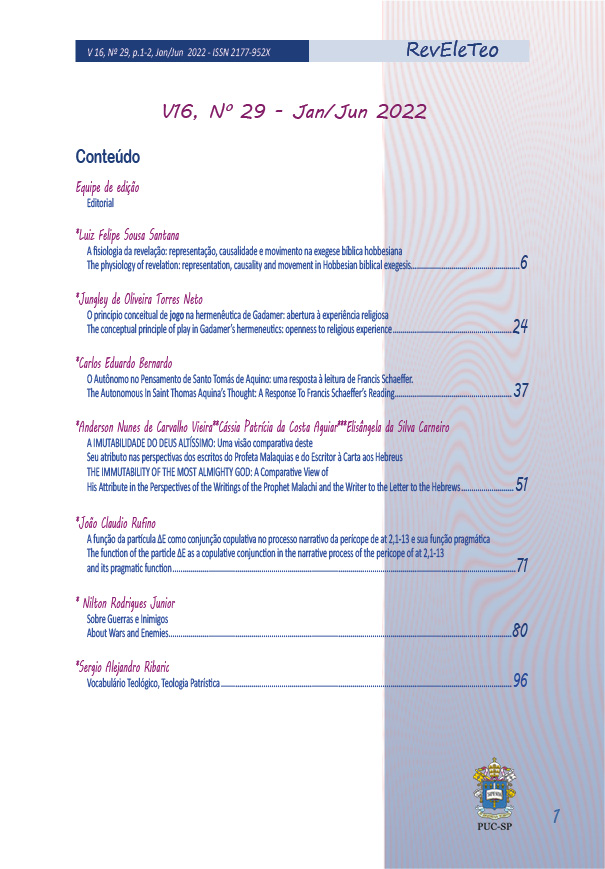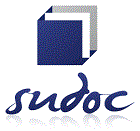THE IMMUTABILITY OF THE MOST ALMIGHTY GOD
A Comparative View of His Attribute in the Perspectives of the Writings of the Prophet Malachi and the Writer to the Letter to the Hebrews
DOI:
https://doi.org/10.23925/2177-952X.2022v16i29p51-70Keywords:
Immutability, Prophet Malachi, Epistle to the HebrewsAbstract
This study dealt with the immutability of the Most High God, through God the Father and God the Son, in a comparative view between the writings of the Book of the Prophet Malachi and the Epistles to the Hebrews. As a question was raised: Is there congruence in the worldviews about the immutability of God between the writings of the Prophet Malachi and the Writer of the Epistle to the Hebrews? In other words, are both authors in line with regard to the immutability of the Most High God? In order to solve the problem raised, the general objective was to identify whether there is agreement of the theological worldview on the immutability of God between the writings of the Prophet Malachi and the Writer of the Epistle to the Hebrews. The methodology used was that of a qualitative type of descriptive and bibliographic character. It is concluded that there is a biblical and theological basis to affirm that both writings are in agreement about the immutability of God, but one in the perspective of God the Father and the other in the perspective of God the Son.
References
AGOSTINHO, Santo. Comentário aos Salmos. Trad. Monjas Beneditinas. Rev. H. Dalbosco. São Paulo: Paulus, 1997. v. II. 85, 12, 8.
BÍBLIA DE ESTUDO DEFESA DA FÉ. Bíblia de Estudo defesa da fé: Questões reais, respostas precisas e fé solidificada. Rio de Janeiro: CPAD, 2010.
CONEGERO, Daniel. Quais são os atributos de Deus? Disponível em: < https://estiloadoracao.com/atributos-de-deus/> acesso em agosto de 2020.
DUTRA, Silvio. A imutabilidade de Deus. Rio de Janeiro: Amazon, 2018.
KAHN, Charles Henry. A arte do pensamento de Heráclito: Uma edição dos fragmentos com tradução e comentário. 2ª ed. São Paulo: Paulus Editora, 2009.
LEWIS, Clive Staples. Os quatro amores. Rio de Janeiro: Thomas Nelson, 2017.
MARCONI, Maria de Andrade; LAKATOS, Eva Maria. Metodologia Científica. São Paulo: Editora Atlas, 1986.
O ESTANDARTE DE CRISTO. A imutabilidade de Cristo por Charles Haddon Spurgeon. A imutabilidade de Cristo, Sermão nº 170 pregado na manhã do dia do Senhor, 3 de janeiro de 1858. Por Charles Haddon Spurgeon no Music Hall, Royal Surrey Gardens. Disponível em: https://oestandartedecristo.com/2019/03/21/a-imutabilidade-de-cristo-por-c-h-spurgeon/. Acesso em agosto de 2020.
SANTOS, José Trindade. Da Natureza — Parmênides. 3. ed. São Paulo: Edições Loyola, 2013.
SEMBLANO, Martinho Lutero. Teologia Sistemática: Teontologia (A doutrina do Deus Pai). São Paulo: Scriptura, 2020.
SERWAY, Raymond. JEWETT, John. Princípios de física – Vol. II – oscilações, ondas e termodinâmica. São Paulo: Cengage Learning, 2014.
SOCIEDADE BÍBLICA DO BRASIL. Bíblia de Estudo Defesa da Fé – Almeida Revista e Corrigida. 4ª ed. Rio de Janeiro: CPAD, 2009.
SOUZA, Nicodemos de. Bibliologia: estudos sobre como a Bíblia chegou até nós. Volume 17. 1ª Ed. Rio de Janeiro: CPAD, 2006.
SPINELLI, Miguel. Filósofos Pré-socráticos. Primeiros Mestres da Filosofia e da Ciência Grega. 2ª edição. Porto Alegre: Edipucrs, 2003.
SPURGEON, Charles Haddson. A imutabilidade de Cristo. Sermão nº 170. Volume IV. New Park Street Pulpit: Estandarte de Cristo, 2016 apud site o Estandarte de Cristo. Disponível em: https://oestandartedecristo.com/2019/03/21/a-imutabilidade-de-cristo-por-c-h-spurgeon/, acesso em agosto de 2020.
STAMPS, Donald Carrel. Bíblia de Estudo Pentecostal – Almeida Revista e Corrigida. 1ª edição. Rio de Janeiro: CPAD, 1995.





